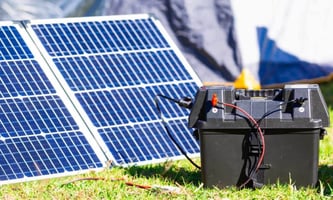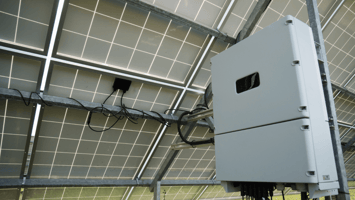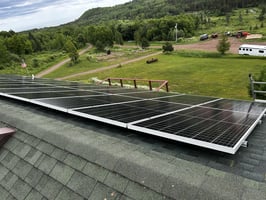Going off grid can greatly reduce utility bills, minimize environmental impact, and prepare for unexpected disasters. But how many solar panels do you need to produce enough power to run a house off grid?
While it was once a complex question that required extensive research into local resources and regulations, Wolf River Electric launches this easy-to-use guide to help you figure out how many solar panels are necessary for powering your home.
Read on to learn more about this awesome resource for future (and current) off-grid dwellers.
Understanding What Is Off Grid Solar System
An off-grid system is a self-contained energy system that is completely independent of the electrical grid. These systems are designed to generate, store, and utilize solar energy to power homes or businesses.
The core of an off grid solar system is a series of solar panels that capture the sun’s energy and convert it into electricity using photovoltaic (PV) cells. This energy is then stored in batteries and can be used to power a wide range of appliances and devices.
When To Go Off Grid
When your utility bills are too high.
If your monthly utility bills are consistently high, consider going off-grid. Utility companies often charge higher rates for customers who use more electricity or water. You can significantly reduce your monthly expenses by generating your own power and water.
When you want to be more self-sufficient.
Going off-grid is great if you want to become more self-sufficient. When you’re off-grid, you’re not reliant on public utilities or services. This means you won’t be affected if there’s a power outage or water main break. You’ll also have peace of mind knowing you can survive even if the grid goes down.
When you want to live a simpler life.
If you’re tired of the hustle and bustle of city life, going off-grid may be a good option for you. When you live off-grid, you’re often forced to simplify your life as there’s no access to modern conveniences. This can be a great way to reduce your stress levels and live a more peaceful life.
When you want to save money.
One of the biggest reasons people avoid grid tied system is to save money. You can avoid paying high monthly utility bills by generating your own power and water. You may also be able to sell any excess power you generate back to the grid, further offsetting your costs.
Go Solar Today!
What Major Equipment Does An Off Grid Solar System Require?
Solar Panels
Solar panels are devices that convert sunlight into electricity. They are made of silicon, which is very good at absorbing sunlight. Solar panels come in various sizes, shapes, and efficiency levels.
Battery
A battery stores electricity. They are made of lead acid, nickel-cadmium, or lithium-ion. Lead acid batteries are the least expensive, heaviest, and least efficient. Nickel-cadmium batteries are more expensive but are lighter and more efficient. Lithium-ion batteries are the most expensive but are also the lightest and most efficient.
Charge Controller
A charge controller regulates the flow of electricity from the solar panels to the battery. Charge controllers come in a variety of different types, including MPPT and PWM. MPPT charge controllers are more expensive but are more efficient at charging batteries. PWM charge controllers are less expensive but are less efficient at charging batteries.
Inverter
An inverter is a device that converts DC electricity into AC electricity. Inverters come in various sizes, shapes, and efficiency levels. The size and efficiency of the inverter will determine how much AC electricity can be generated from the DC electricity stored in the batteries.
Difference Between Off-Grid Vs On-Grid
Off-grid solar systems are completely self-sufficient and independent. They are not connected to the electrical grid, so they do not draw power from utility companies. Instead, they consist of renewable energy components only, such as solar panels, batteries, and controllers that store and manage the electricity generated by your system.
On-grid solar systems, on the other hand, are connected to a utility company’s power grid and draw electricity from them when needed. This allows you to take advantage of net metering when your utility company pays you for the excess power you generate.
Learn more about: the differences between Off-Grid Vs On-Grid
How To Build An Off The Grid Solar System
First, decide where you want to put your solar panels. You’ll need to place your solar panels in a location with plenty of sunlight.
Go ahead and calculate the number of solar panels you’ll need. You can use an online calculator, such as the one provided by the U.S. Department of Energy, to determine how many solar panels you’ll need for energy production.
Choose the type of solar panel you want to use. There are different types of solar panels, so choose your perfect choice depending on your budget.
Finally, mount and connect the solar panel to an inverter. An inverter converts direct current (DC) into alternating current (AC).
Conclusion

After taking into account the size of your family, your electricity needs and expenses, and your daily activities, you can now determine how many solar panels it will take to run a house off grid.
With the right number of solar panels and their installation, you can ensure that your home has a steady energy supply so that you can take advantage of all the benefits renewable energy has to offer.
Plus, installing solar panels to power your home not only offsets expensive electricity bills but also helps reduce your carbon footprint. So why wait? Get the right-sized solar panel system for your home today and start using clean energy for a greener future.
Frequently Asked Questions
Yes, off-grid solar energy can be a great investment. It allows homeowners to become less reliant on the local power grid, saving money on utility bills and helping protect against power outages. Also, investments in renewable energy sources like solar power tend to have long-term financial benefits, as well as environmental ones.
The number of solar power panels you need to go off-grid relies on the size of your home, how much energy you use, and where you live. Ideally, the more energy you consume and the larger your home, the more solar panels you need. Fewer solar panels are only applicable when your energy consumption is low.
The cost of going off grid varies depending on solar panels cost, how many panels you need, and the complexity of your solar energy system. You can expect to spend anywhere from $10,000-$30,000 upfront for the necessary equipment and fee to install solar panels.
Join Our Solar Community
Get exclusive access to the latest solar news, tips, and promotions!


